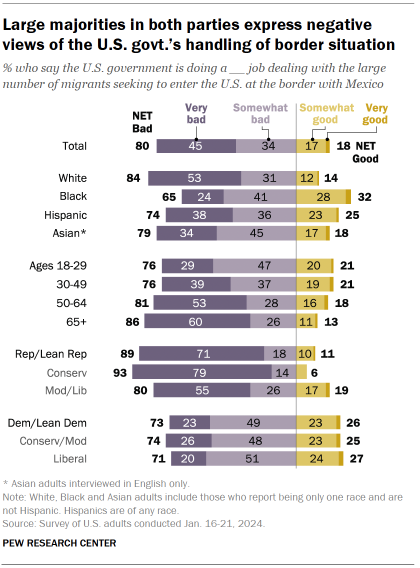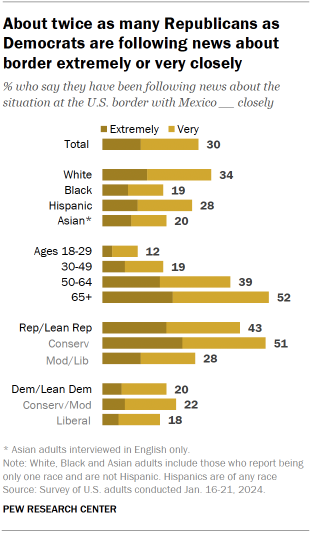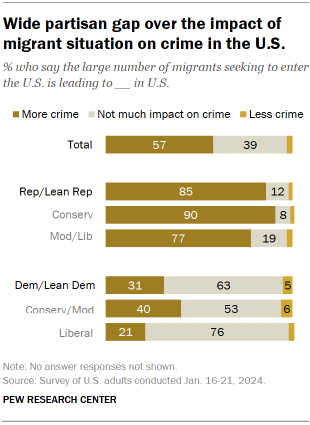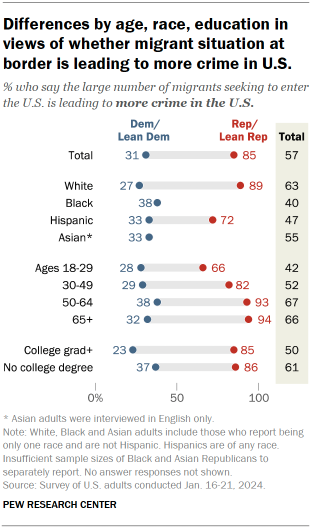Nearly all Americans say the large number of migrants seeking to enter the United States at the Mexican border is a problem. However, perceptions of the seriousness of the problem differ significantly:
- Most adults say the situation is either a crisis (45%) or a major problem (32%).
- Just 21% view it as a minor problem (17%) or not a problem (4%).
Views by age, race and ethnicity

Young adults are less likely than older people to say the situation at the border is a crisis. Only about a quarter (23%) of adults under 30 view it as a crisis, compared with 38% of those 30 to 49 and a 60% majority of adults ages 50 and older.
About half of White adults (52%) say the influx of migrants is a crisis, higher than the shares of Hispanic, Asian (38% each) and Black (26%) adults who say the same.
Views by partisanship, ideology
Republicans and Republican-leaning independents are far more likely than Democrats and Democratic leaners to say that the border situation is a crisis: 70% of Republicans describe it as a crisis, compared with 22% of Democrats.
More Democrats, by contrast, view it as a major problem (44% vs. 20% of Republicans). And while a third of Democrats say the border situation is a minor problem or not a problem, just 9% of Republicans say the same.
Ideological differences are wider within the GOP. A sizable majority of conservative Republicans (81%) say the large number of migrants at the border seeking to enter the U.S. represents a crisis. About half of moderate and liberal Republicans (53%) say the same.
Democrats’ differences are more modest. However, 41% of liberal Democrats say the border situation is a minor problem or not a problem, compared with 27% of moderate Democrats.
How is the U.S. government doing in handling the situation at the border?

As has been the case for the last few years, Americans express very negative views of the government’s handling of the border situation:
- 80% say the government is doing a very or somewhat bad job of dealing with the large number of migrants seeking to enter the U.S – including 45% who say it’s doing a very bad job.
- Just 18% have a positive view of the government’s handling of the situation.
Both partisan coalitions are broadly dissatisfied with the government’s handling of the border situation.
About nine-in-ten (89%) Republicans say the government is doing a bad job, including 71% who say it is doing very badly. Nearly three-quarters (73%) of Democrats also rate the government’s performance negatively.
Large majorities across age categories and all racial and ethnic groups say the government is doing a bad job dealing with the migrant situation at the U.S.-Mexico border.
Wide age, partisan differences in attention to border situation
Republicans are much more interested than Democrats in news about the situation at the U.S.-Mexico border.

- 43% of Republicans say they are following news about the border situation extremely or very closely, compared with 20% of Democrats.
- Conservative Republicans are especially interested in news about the border: 51% say they are following this news extremely or very closely while only 28% of moderate and liberal Republicans say the same.
Age differences
Young adults are far less engaged with news about the U.S.-Mexico border than are older people.
Just 12% of adults under 30 say they are following this news extremely or very closely; another 30% say they are following somewhat closely. A majority of young adults (57%) follow news about the border not too or not at all closely.
Interest is higher among older age groups: 45% of adults ages 50 and older are following news about the border extremely or very closely.
Does the migration surge have an impact on crime in the U.S.?
Republicans and Democrats have very different views about whether the large number of migrants seeking to enter the U.S. has an impact on crime in the country.

Republicans and Republican leaners overwhelmingly say the large number of migrants trying to enter the country is leading to more crime in the country: 85% say this, including 90% of conservative Republicans and 77% of moderate and liberal Republicans.
By comparison, a far smaller share of Democrats – 31% – say crime is increasing because of the migrant surge. Most Democrats (63%) say the number of migrants trying to enter the U.S. at the border doesn’t have much effect on crime.
Moderate and conservative Democrats are more likely than liberals to say the number of migrants seeking to enter the U.S. is leading to more crime (40% vs. 21%). Still, majorities in both groups say there isn’t much relationship between the migrants and crime in the U.S.
Few in either party (just 5% of Democrats and 2% of Republicans) say the migrant situation at the border is leading to less crime in the U.S.
How demographic groups view the relationship between the border surge and crime
Partisanship is, by far, the strongest predictor of whether someone thinks there is a relationship between the migration surge and crime in the U.S.

But there are also some differences in these views by age, race and education, even after accounting for partisanship.
Race and ethnicity
Overall, White and Asian Americans are more likely than Hispanic and Black Americans to say that the migrant surge is leading to increased crime in the U.S.
- Majorities of both White and Hispanic Republicans say the number of migrants seeking to enter the U.S. is contributing to crime in the country, but this view is more widespread among White Republicans (89%) than Hispanic Republicans (72%). (There is insufficient sample size of Black and Asian Republicans to separately report these views.)
- Most Democrats – across racial and ethnic groups – do not think the migration situation is leading to more crime in the U.S. But Black Democrats (38%) are more likely than White Democrats (27%) to say that it is.
Age
Overall, younger adults are far less likely than older adults to say the migration situation is resulting in more crime.
This gap is particularly pronounced among Republicans: 66% of Republicans under 30 say the migration surge is leading to more crime, compared with 82% of those ages 30 to 49 and 93% of those 50 and older.
By comparison, there is a narrower age gap among Democrats: 28% of those under 50 and 35% of those 50 and older say crime is increasing due to the migrant situation.
Education
Overall, those with a bachelor’s degree or more education are 11 percentage points less likely than those with less formal education to say crime in the U.S. has increased because of the situation at the U.S.-Mexico border.
There are no significant differences among Republicans by education. But Democrats without a bachelor’s degree (37%) are more likely than those with a degree (23%) to say the large number of migrants seeking to enter the U.S. is leading to more crime.


